Kenneth C. Davis's Blog, page 89
March 26, 2014
“A lover’s quarrel with the world”-Robert Frost
In honor of his birthday on March 26, 1874, a video tribute to Robert Frost.
I had a lover’s quarrel with the world
Robert Frost’s epitaph

Robert Frost (Courtesy Library of Congress)
One of my favorite places in Vermont is the Frost grave-site in the cemetery of the First Church in Old Bennington -just down the street from the Bennington Monument. This video was recorded there.
Apples, birches, hayfields and stone walls; simple features like these make up the landscape of four-time Pulitzer Prize winner Robert Frost’s poetry. Known as a poet of New England, Frost (1874-1963) spent much of his life working and wandering the woods and farmland of Massachusetts, Vermont, and New Hampshire. As a young man, he dropped out of Dartmouth and then Harvard, then drifted from job to job: teacher, newspaper editor, cobbler. His poetry career took off during a three-year trip to England with his wife Elinor where Ezra Pound aided the young poet. Frost’s language is plain and straightforward, his lines inspired by the laconic speech of his Yankee neighbors.
But while poems like “Stopping by Woods on a Snowy Evening” are accessible enough to make Frost a grammar-school favorite, his poetry is contemplative and sometimes dark—concerned with themes like growing old and facing death. One brilliant example is this poem about a young boy sawing wood, Out, out–
The buzz-saw snarled and rattled in the yard
And made dust and dropped stove-length sticks of wood,
The first poet invited to speak at a Presidential inaugural, Frost told the new President:
Be more Irish than Harvard. Poetry and power is the formula for another Augustan Age. Don’t be afraid of power.
A brief biography of Robert Frost can be found at Poets.org, where there are more samples of his poetry. It includes an account of Frost and JFK.
Robert Frost died on January 29, 1963. He had written his own epitaph, “I had a lover’s quarrel with the world,” etched on his headstone in a church cemetery in Bennington, VT.
Here is the NYTimes obituary published after his death.
This material is adapted from Don’t Know Much About Literature written in collaboration with Jenny Davis.
March 25, 2014
Announcing New Round of Classroom “Virtual Visits”
PRESIDENTS, CONFLICT, AND CRISIS: A CLASSROOM SKYPE® PROGRAM

Dear Teachers,
Throughout American History, wars have provided the backdrop of some of the greatest crises faced by American presidents. In the spring of 2014, Kenneth C. Davis can Skype® into your classroom to discuss some of these moments in a program called Presidents, Conflict & Crisis.
Among the significant topics he will discuss:
•150 years ago Abraham Lincoln faced the possibility of losing the presidency as the Civil War entered a critical and costly period with some of the war’s most deadly fighting at such battles as Cold Harbor, Atlanta and the Siege of Petersburg. At the time Lincoln feared he would not be reelected or even nominated by the Republicans.
•100 years ago, Woodrow Wilson had to confront the possibility of America getting involved in Europe’s “Great War,” later known as World War I.
•70 years ago, World War II entered a crucial phase as the United States and its Allies prepared for the D-Day invasion (June 6, 1944) and Franklin D. Roosevelt had to decide if he should run for an unprecedented fourth term.
•50 years ago, Lyndon B. Johnson was attempting to pass a landmark civil rights law even as he deepened America’s involvement with Vietnam, especially after the Gulf of Tonkin incident in the summer of 1964. Johnson was also facing re-election, having become president after John F. Kennedy’s assassination in November 1963.
•10 years ago, George W. Bush took American deeper into its war in Iraq even though he had declared major combat operations over a year earlier, as a violent insurgency spread in such cities as Fallujah, Baghdad and Najaf.
How did these presidents respond to these crises and what lessons can history teach us today about going to war?
KENNETH C. DAVIS will offer a LIMITED number of free SKYPE® sessions to middle school and high school Social Studies classes, based on his availability. These sessions will be scheduled from APRIL 22 THROUGH MAY 2014.
Each classroom session will last about 30 to 45 minutes and include time for students to ask questions.
To inquire about booking a session, please go to this website’s Contact page.
NOTE: PLEASE INCLUDE GRADE LEVEL, CLASS SIZE, NAME, AND ADDRESS of your school along with any school or class website, if applicable.
And download a free VIRTUAL CLASSROOM VISIT Media kit which includes:
· A book excerpt
· Myths/Truths Quiz
· Myths/Truths Quiz Answer Key
· Virtual Event Poster
· Q&A with Author Kenneth C. Davis
· Author photo
And remember, what you don’t know can be thrilling!
March 24, 2014
Who Said It? (3/24/14)
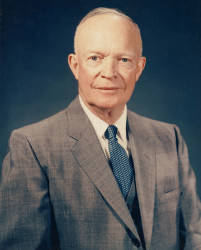
President Eisenhower (Courtesy: Eisenhower Presidential Library and Museum)
President Dwight D. Eisenhower (September 17, 1952)
I have no use for those — regardless of their political party — who hold some foolish dream of spinning the clock back to days when unorganized labor was a huddled, almost helpless mass.
Speech to the American Federation of Labor, New York City, 9/17/52
Today in America unions have a secure place in our industrial life. Only a handful of unreconstructed reactionaries harbor the ugly thought of breaking unions. Only a fool would try to deprive working men and women of the right to join the union of their choice.
Speech to the American Federation of Labor, New York City, 9/17/52
Source: Eisenhower Presidential Library
Hero of World War II, President Dwight D. Eisenhower died of congestive heart failure in Washington, D.C. on March 28, 1969.
This obituary and appraisal appeared the following day in the New York Times.
March 17, 2014
Who Said It? (3/17/2014)
Frederick Douglass “Men of Color, To Arms!” (March 21, 1863)

Frederick Douglass (Image Courtesy of Frederick Douglass National Historic Site (National Parks Service)
A war undertaken and brazenly carried on for the perpetual enslavement of colored men, calls logically and loudly for colored men to help suppress it. Only a moderate share of sagacity was needed to see that the arm of the slave was the best defense against the arm of the slaveholder. Hence with every reverse to the national arms, with every exulting shout of victory raised by the slaveholding rebels, I have implored the imperiled nation to unchain against her foes, her powerful black hand. Slowly and reluctantly that appeal is beginning to be heeded. Stop not now to complain that it was not heeded sooner. It may or it may not have been best that it should not. This is not the time to discuss that question. Leave it to the future. When the war is over, the country is saved, peace is established, and the black man’s rights are secured, as they will be, history with an impartial hand will dispose of that and sundry other questions. Action! Action! not criticism, is the plain duty of this hour. Words are now useful only as they stimulate to blows. The office of speech now is only to point out when, where, and how to strike to the best advantage. There is no time to delay. The tide is at its flood that leads on to fortune. From East to West, from North to South, the sky is written all over, “Now or never.” Liberty won by white men would lose half its luster.
“MEN OF COLOR, TO ARMS!”
Broadside, Rochester, March 21, 1863 (University of Rochester-Frederick Douglass Project)
For more on Douglass visit the National Parks Service Frederick Douglass National Historic Site
March 15, 2014
Don’t Know Much About® Andrew Jackson
Andrew Jackson, the 7th President of the United States, was born on March 15, 1767 in Waxhaw (on the border of both South and North Carolina, the exact location is uncertain). Does he deserve his place on the $20 bill? 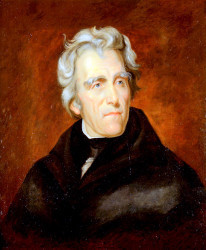 In his day and ever since, Andrew Jackson has inspired high emotions and sharp opinions. Thomas Jefferson once called him, “A dangerous man. ”
In his day and ever since, Andrew Jackson has inspired high emotions and sharp opinions. Thomas Jefferson once called him, “A dangerous man. ”
His predecessor as president, John Quincy Adams, a bitter political rival, said Jackson was,
“A barbarian who could not even write a sentence of grammar and could hardly spell his own name.”
As a boy in the American Revolution, as a self-taught military commander, and as two-term president –serving from 1829-1837– Andrew Jackson was one of the most influential and powerful of American chief executives. Although his greatest fame as a soldier came during the Battle of New Orleans in the War of 1812, Jackson established his reputation as a tough and remorseless leader during the Creek War, fought as the War of 1812 was already underway.
His place and reputation as an Indian fighter in this overlooked fight against the Creek Indians began with the worst frontier massacre in American history on August 30, 1813, when a group of Creek Indians, led by a half-Creek, half-Scot warrior named William Weatherford, or Red Eagle, attacked an outpost known as Fort Mims north of Mobile, Alabama. Like Pearl Harbor or 9/11, it was an event that shocked the nation. Soon, Red Eagle and his Creek warriors were at war with Andrew Jackson, the Nashville lawyer turned politician, who had no love for the British or Native Americans.
You know the name of Andrew Jackson. But you don’t know the name William Weatherford. You should. He was a charismatic leader of his people who wanted freedom and to protect his land. Just like “Braveheart,” or William Wallace, of Mel Gibson fame. Only William Weatherford, or Red Eagle, wasn’t fighting a cruel King. He was at war with the United States government. And Andrew Jackson. This video offers a quick overview of Weatherford’s war with Jackson that ultimately led the demise of the Creek nation.
You can read more about William Weatherford, Andrew Jackson, and Jackson’s role in American history in A NATION RISING. Andrew Jackson’s life and presidency are also covered in Don’t Know Much About® the American Presidents.

Don’t Know Much About the American Presidents (2012)
(From Hyperion and Random House Audio)
PBS also offers a good look at the different sides of Andrew Jackson.
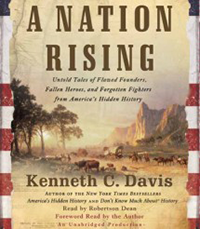
A NATION RISING (Harper paperback/Random House Audio)
March 10, 2014
Who Said It? (3/9/2014)
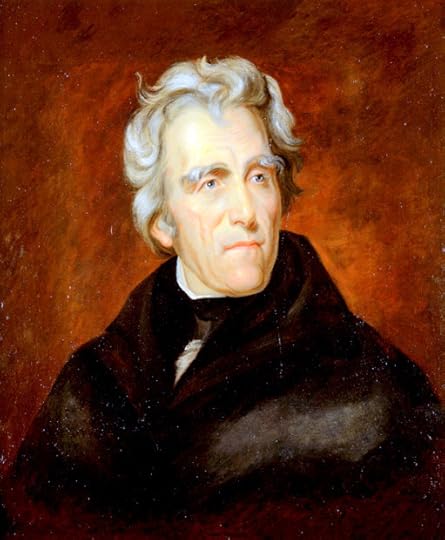
Andrew Jackson 7th President of the U.S. by Thomas Sully (1825) Source: United States Senate
President Andrew Jackson: “Veto Message Regarding the Bank of the United States “(July 10, 1832)
It is to be regretted that the rich and powerful too often bend the acts of government to their selfish purposes. Distinctions in society will always exist under every just government. Equality of talents, of education, or of wealth can not be produced by human institutions. In the full enjoyment of the gifts of Heaven and the fruits of superior industry, economy, and virtue, every man is equally entitled to protection by law; but when the laws undertake to add to these natural and just advantages artificial distinctions, to grant titles, gratuities, and exclusive privileges, to make the rich richer and the potent more powerful, the humble members of society-the farmers, mechanics, and laborers-who have neither the time nor the means of securing like favors to themselves, have a right to complain of the injustice of their Government. There are no necessary evils in government. Its evils exist only in its abuses. If it would confine itself to equal protection, and, as Heaven does its rains, shower its favors alike on the high and the low, the rich and the poor, it would be an unqualified blessing. In the act before me there seems to be a wide and unnecessary departure from these just principle
Full Text at Avalon Project-Yale Law School
The charter of the Second Bank of the United States had become a sharp political issue between Andrew Jackson and his enemies, most notably Senator Henry Clay and Second Bank of the United States President Nicholas Biddle. Jackson vetoed a bill rechartering the Bank in 1832 and his veto was sustained. The Bank –Jackson and his allies depicted it as the “Monster Bank” — became a campaign issue in the 1832 presidential election which Jackson won in a landslide.
Andrew Jackson was born on March 15, 1767 in the Waxhaws region between North and South Carolina. He died on June 8, 1845.
March 4, 2014
Pop Quiz: When was the last March 4th Inauguration?

Franklin D. Roosevelt in 1933
Franklin D. Roosevelt was the last president to take the oath office on March 4 in 1933, when he was sworn in for his first term. But Inauguration Day is now set on January 20th. When did that happen and why?
The change followed ratification of the 20th Amendment in January 1933. This alteration came about because the period between Election Day and the opening of a new session of Congress or a presidential inauguration was too long under the original terms of the Constitution, sometimes creating a crisis as a “lame duck” Congress or the outgoing president could not act. Nor could the incoming president-elect respond to an emergency, as in the case of Abraham Lincoln in 1861.
As the National Constitution Center explains:
“The drama over March 4 every year ended when the 20th Amendment was ratified in 1933. Part of the amendment eliminated an extended lame-duck Congress. The new amendment set January 3 as the starting day of a new Congress and January 20 as inauguration day for the president. The previous congressional and presidential terms ended just before the new terms began.”
AMENDMENT XX
Passed by Congress March 2, 1932. Ratified January 23, 1933.
Section 1.
The terms of the President and the Vice President shall end at noon on the 20th day of January, and the terms of Senators and Representatives at noon on the 3rd day of January, of the years in which such terms would have ended if this article had not been ratified; and the terms of their successors shall then begin.
The complete text of Amendment XX can be found at The Constitution of the United States at the National Archives or at the National Constitution Center
The original March 4 inaugural date was the day that the United States government was supposed to start business back in 1789 after the transfer of power from the previous government under the Articles of Confederation.
Ironically, there were not enough members of Congress for a quorum that day so the government actually started with a “shutdown.” The National Constitution Center offers an interesting history of the “birthday of the U.S. Government.”
Franklin D. Roosevelt then became the first president to take the oath of office on the new date on January 20, 1937 when he was sworn in for his second term.
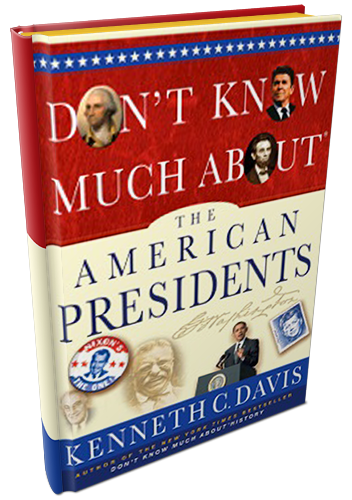
Don’t Know Much About® the American Presidents (2012)
(From Hyperion and Random House Audio)
March 3, 2014
Who Said It? (3/3/2014)

Abraham Lincoln’s Second Inaugural (March 4, 1865) Photo Courtesy of the Library of C0ngress
Abraham Lincoln, Second Inaugural Address (March 4, 1865)
Neither party expected for the war the magnitude or the duration which it has already attained. Neither anticipated that the cause of the conflict might cease with or even before the conflict itself should cease. Each looked for an easier triumph, and a result less fundamental and astounding. Both read the same Bible and pray to the same God, and each invokes His aid against the other. It may seem strange that any men should dare to ask a just God’s assistance in wringing their bread from the sweat of other men’s faces, but let us judge not, that we be not judged.
Complete text at Avalon Project- Yale Law School
The greatest inaugural address in American presidential history? Hard to argue for another.
Here are some more resources to explore Lincoln’s Second Inaugural Address from the National Endowment for the Humanities Edsitement website.
And you can rad more about Lincoln and the Civil War in Don’t Know Much About® the American Presidents and Don’t Know Much About® the Civil War


Don’t Know Much About the American Presidents (2012)
(From Hyperion and Random House Audio)
February 24, 2014
Who Said It? (2/24/14)
Georgia Ordinance of Secession (Approved, Tuesday, January 29, 1861)

The question of “Confederate heritage” has been raised once more in the latest dust up over the Confederate flag. It comes from Georgia where a “vanity” or special license plate features the Confederate battle flag, as the Atlanta Journal Constitution reported.
The state of Georgia has released a new specialty license tag that features the Confederate battle flag, inflaming civil rights advocates and renewing a debate on what images should appear on state-issued materials. The new specialty tag has stirred a clash between those who believe the battle flag honors Confederate heritage and those, particularly African-Americans, who view it as a racially charged symbol of oppression.
Since this issue once more raises the question of “Confederate heritage,” code words for why the Civil War was fought, it presents an opportunity to revisit exactly why the state of Georgia decided to secede from the Union in January 1861. This is also a good example of doing some primary document reading as called for in the Common Core.
Here is the opening paragraph of the Georgia Ordinance of Secession:
The people of Georgia having dissolved their political connection with the Government of the United States of America, present to their confederates and the world the causes which have led to the separation. For the last ten years we have had numerous and serious causes of complaint against our non-slave-holding confederate States with reference to the subject of African slavery. They have endeavored to weaken our security, to disturb our domestic peace and tranquility, and persistently refused to comply with their express constitutional obligations to us in reference to that property, and by the use of their power in the Federal Government have striven to deprive us of an equal enjoyment of the common Territories of the Republic. This hostile policy of our confederates has been pursued with every circumstance of aggravation which could arouse the passions and excite the hatred of our people, and has placed the two sections of the Union for many years past in the condition of virtual civil war. . . . The party of Lincoln, called the Republican party . . . is admitted to be an anti-slavery party. While it attracts to itself by its creed the scattered advocates of exploded political heresies, of condemned theories in political economy, the advocates of commercial restrictions, of protection, of special privileges, of waste and corruption in the administration of Government, anti-slavery is its mission and its purpose. By anti-slavery it is made a power in the state.
Text of Georgia Secession Ordinance January 29, 1861 Source: The Avalon Project-Yale Law School
The text concludes by setting a price tag on slavery and raising the specter of the threat to Southern wives and children:
Because by their declared principles and policy they have outlawed $3,000,000,000 of our property in the common territories of the Union; put it under the ban of the Republic in the States where it exists and out of the protection of Federal law everywhere; because they give sanctuary to thieves and incendiaries who assail it to the whole extent of their power, in spite of their most solemn obligations and covenants; because their avowed purpose is to subvert our society and subject us not only to the loss of our property but the destruction of ourselves, our wives, and our children, and the desolation of our homes, our altars, and our firesides.
This is Georgia’s stated reason for its “Confederate heritage.”
February 18, 2014
Virginia and the Lovings-Then and Now
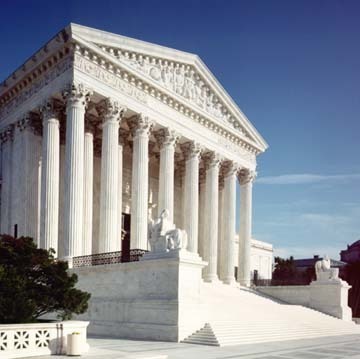
Source: Supreme Court of the United States
We have arrived upon another moment in history when We the People becomes more inclusive, and our freedom more perfect.
-U.S District Judge Arenda L. Wright Allen (Decision on Virginia Ban on Same-Sex Marriage February 14, 2014)
Last week, a federal judge in Virginia overturned Virginia’s constitutional ban on same-sex marriages.
The decision by Judge Arenda L. Wright Allen of the Federal District Court in Norfolk, Virginia relied on the Supreme Court decision made last year in United States v. Windsor which ruled that the federal government must provide benefits to same-sex couples married in states that allow such unions. Judge Wright Allen opened her 41-page decision with a quotation from Mildred Loving who successfully challenged Virginia’s ban on interracial marriage in 1967.
Government has no business imposing some people’s religious beliefs over others. . . . I support the freedom to marry for all. That’s what Loving, and loving, are all about. – Mildred Loving, “Loving for All”
Public Statement on the 40th Anniversary of Loving v. Virginia (June 12, 2007).
I wrote about the Lovings and their case in this June 2013 post.
In 1967, the Lovings’s Supreme Court victory over the state of Virginia ended bans on interracial marriage in America. Will Judge Wright Allen’s decision against Virginia in 2014 have similar repercussions?
Judge Wright Allen’s decision included this statement:
A spirited and controversial debate is underway regarding who may enjoy the right to marry in the United States of America. America has pursued a journey to make and keep our citizens free. This journey has never been easy, and at times has been painful and poignant. The ultimate exercise of our freedom is choice. Our Declaration of Independence recognizes that “all men” are created equal. Surely this means all of us. While ever-vigilant for the wisdom that can come from the voices of our voting public, our courts have never long tolerated the perpetuation of laws rooted in unlawful prejudice. One of the judiciary’s noblest endeavors is to scrutinize laws that emerge from such roots.
This ruling also referred to the “due process” and “equal protection” clauses of 14th Amendment to the Constitution. Read more about the 14th Amendment from the National Constitution Center.
Since the Supreme Court decisions on marriage equality last year, the number of states with legal same-sex marriage has grown to 17 plus the District of Columbia, and court challenges to same-sex marriage bans are underway in several other states, including Oklahoma and Utah. The Washington Post published this graphic map of the current state of marriage equality in the United States.




